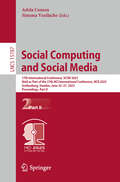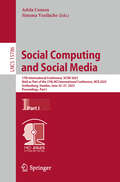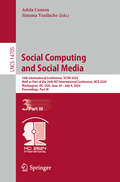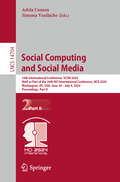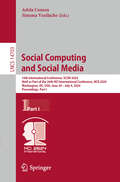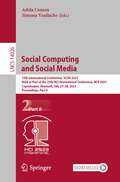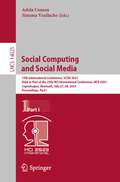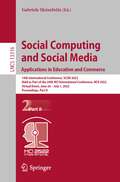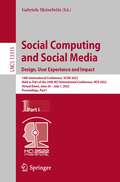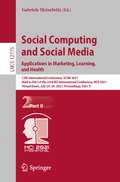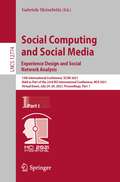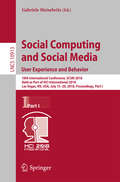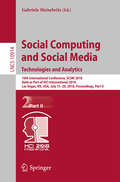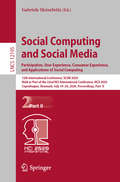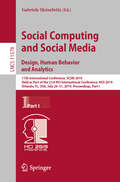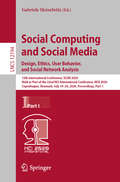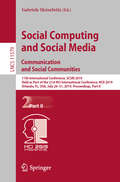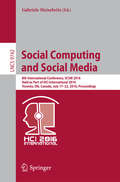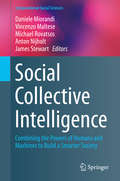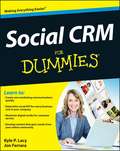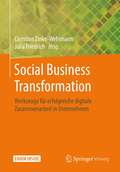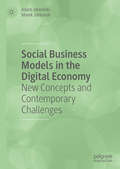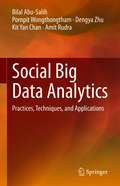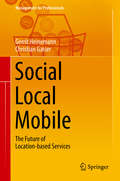- Table View
- List View
Social Computing and Social Media: 17th International Conference, SCSM 2025, Held as Part of the 27th HCI International Conference, HCII 2025, Gothenburg, Sweden, June 22–27, 2025, Proceedings, Part II (Lecture Notes in Computer Science #15787)
by Adela Coman Simona VasilacheThis book constitutes the refereed proceedings of the 17th International Conference on Social Computing and Social Media, SCSM 2025, held as part of the 27th HCI International Conference, HCII 2025, which took place in Gothenburg, Sweden, during June 22–27, 2025. A total of 1430 papers and 355 posters included in the HCII 2025 proceedings was carefully reviewed and selected from 7972 submissions. The SCSM 2025 proceedings were organized in the following topical sections- Designing and Developing Social Interactions, Social Media in Learning and Education, Supporting Communication and Psychological Well-Being, User Behavior and Experience in Social Media, and, AI and Social Network Analysis.
Social Computing and Social Media: 17th International Conference, SCSM 2025, Held as Part of the 27th HCI International Conference, HCII 2025, Gothenburg, Sweden, June 22–27, 2025, Proceedings, Part I (Lecture Notes in Computer Science #15786)
by Adela Coman Simona VasilacheThis book constitutes the refereed proceedings of the 17th International Conference on Social Computing and Social Media, SCSM 2025, held as part of the 27th HCI International Conference, HCII 2025, which took place in Gothenburg, Sweden, during June 22–27, 2025. A total of 1430 papers and 355 posters included in the HCII 2025 proceedings was carefully reviewed and selected from 7972 submissions. The SCSM 2025 proceedings were organized in the following topical sections- Designing and Developing Social Interactions, Social Media in Learning and Education, Supporting Communication and Psychological Well-Being, User Behavior and Experience in Social Media, and, AI and Social Network Analysis.
Social Computing and Social Media: 16th International Conference, SCSM 2024, Held as Part of the 26th HCI International Conference, HCII 2024, Washington, DC, USA, June 29–July 4, 2024, Proceedings, Part III (Lecture Notes in Computer Science #14705)
by Adela Coman Simona VasilacheThis book constitutes the refereed proceedings of the 16th International Conference on Social Computing and Social Media, SCSM 2024, held as part of the 26th HCI International Conference, HCII 2024, which took place in Washington, DC, USA, during June 29–July 4, 2024. The total of 1271 papers and 309 posters included in the HCII 2024 proceedings was carefully reviewed and selected from 5108 submissions. The SCSM 2024 proceedings were organized in the following topical sections: Part I: Designing, developing and evaluating social media; user experience and user behavior in social media; AI and language models in social media; Part II: Social media in learning, education and culture; social media in business and ecommerce; Part III: Computer-mediated communication; social media for community, society and democracy.
Social Computing and Social Media: 16th International Conference, SCSM 2024, Held as Part of the 26th HCI International Conference, HCII 2024, Washington, DC, USA, June 29–July 4, 2024, Proceedings, Part II (Lecture Notes in Computer Science #14704)
by Adela Coman Simona VasilacheThis book constitutes the refereed proceedings of the 16th International Conference on Social Computing and Social Media, SCSM 2024, held as part of the 26th HCI International Conference, HCII 2024, which took place in Washington, DC, USA, during June 29–July 4, 2024. The total of 1271 papers and 309 posters included in the HCII 2024 proceedings was carefully reviewed and selected from 5108 submissions. The SCSM 2024 proceedings were organized in the following topical sections: Part I: Designing, developing and evaluating social media; user experience and user behavior in social media; AI and language models in social media; Part II: Social media in learning, education and culture; social media in business and ecommerce; Part III: Computer-mediated communication; social media for community, society and democracy.
Social Computing and Social Media: 16th International Conference, SCSM 2024, Held as Part of the 26th HCI International Conference, HCII 2024, Washington, DC, USA, June 29–July 4, 2024, Proceedings, Part I (Lecture Notes in Computer Science #14703)
by Adela Coman Simona VasilacheThis book constitutes the refereed proceedings of the 16th International Conference on Social Computing and Social Media, SCSM 2024, held as part of the 26th HCI International Conference, HCII 2024, which took place in Washington, DC, USA, during June 29–July 4, 2024. The total of 1271 papers and 309 posters included in the HCII 2024 proceedings was carefully reviewed and selected from 5108 submissions. The SCSM 2024 proceedings were organized in the following topical sections: Part I: Designing, developing and evaluating social media; user experience and user behavior in social media; AI and language models in social media; Part II: Social media in learning, education and culture; social media in business and ecommerce; Part III: Computer-mediated communication; social media for community, society and democracy.
Social Computing and Social Media: 15th International Conference, SCSM 2023, Held as Part of the 25th HCI International Conference, HCII 2023, Copenhagen, Denmark, July 23–28, 2023, Proceedings, Part II (Lecture Notes in Computer Science #14026)
by Adela Coman Simona VasilacheThis two-volume set LNCS 14025 and 14026 constitutes the refereed proceedings of the 15th International Conference on Social Computing and Social Media, SCSM 2023, held as part of the 25th International Conference, HCI International 2023, held in Copenhagen, Denmark in July 2023.The total of 1578 papers and 396 posters included in the HCII 2023 proceedings was carefully reviewed and selected from 7472 submissions. The SCSM 2023 conference offers a wide range of topics related to the design, development, assessment, use, and impact of social media.
Social Computing and Social Media: 15th International Conference, SCSM 2023, Held as Part of the 25th HCI International Conference, HCII 2023, Copenhagen, Denmark, July 23–28, 2023, Proceedings, Part I (Lecture Notes in Computer Science #14025)
by Adela Coman Simona VasilacheThis two-volume set LNCS 14025 and 14026 constitutes the refereed proceedings of the 15th International Conference on Social Computing and Social Media, SCSM 2023, held as part of the 25th International Conference, HCI International 2023, held in Copenhagen, Denmark in July 2023.The total of 1578 papers and 396 posters included in the HCII 2023 proceedings was carefully reviewed and selected from 7472 submissions. The SCSM 2023 conference offers a wide range of topics related to the design, development, assessment, use, and impact of social media.
Social Computing and Social Media: 14th International Conference, SCSM 2022, Held as Part of the 24th HCI International Conference, HCII 2022, Virtual Event, June 26 – July 1, 2022, Proceedings, Part II (Lecture Notes in Computer Science #13316)
by Gabriele MeiselwitzThis two-volume set LNCS 13315 and 13316 constitutes the refereed proceedings of the 14th International Conference on Social Computing and Social Media, SCSM 2022, held as part of the 24rd International Conference, HCI International 2022, which took place in June-July 2022. Due to COVID-19 pandemic the conference was held virtually.The total of 1276 papers and 275 posters included in the 40 HCII 2022 proceedings volumes was carefully reviewed and selected from 5583 submissions. The papers of SCSM 2022, Part II, are organized in topical sections named: social media in education; customer experience and consumer behavior.
Social Computing and Social Media: 14th International Conference, SCSM 2022, Held as Part of the 24th HCI International Conference, HCII 2022, Virtual Event, June 26 – July 1, 2022, Proceedings, Part I (Lecture Notes in Computer Science #13315)
by Gabriele MeiselwitzThis two-volume set LNCS 13315 and 13316 constitutes the refereed proceedings of the 14th International Conference on Social Computing and Social Media, SCSM 2022, held as part of the 24rd International Conference, HCI International 2022, which took place in June-July 2022. Due to COVID-19 pandemic the conference was held virtually.The total of 1276 papers and 275 posters included in the 40 HCII 2022 proceedings volumes was carefully reviewed and selected from 5583 submissions. The papers of SCSM 2022, Part I, are organized in topical sections named: design and user experience in social media and social live streaming; text analysis and AI in social media; social media impact on society and business.
Social Computing and Social Media: 13th International Conference, SCSM 2021, Held as Part of the 23rd HCI International Conference, HCII 2021, Virtual Event, July 24–29, 2021, Proceedings, Part II (Lecture Notes in Computer Science #12775)
by Gabriele MeiselwitzThis two-volume set LNCS 12774 and 12775 constitutes the refereed proceedings of the 12th International Conference on Social Computing and Social Media, SCSM 2021, held as part of the 23rd International Conference, HCI International 2021, which took place in July 2021. Due to COVID-19 pandemic the conference was held virtually. The total of 1276 papers and 241 poster papers included in the 39 HCII 2021 proceedings volumes was carefully reviewed and selected from 5222 submissionsThe regular papers of SCSM 2021, Part II, are organized in topical sections named: SCSM in Marketing and Customer Behavior; Social Computing in Learning and Education; SCSM in Health and Wellbeing.
Social Computing and Social Media: 13th International Conference, SCSM 2021, Held as Part of the 23rd HCI International Conference, HCII 2021, Virtual Event, July 24–29, 2021, Proceedings, Part I (Lecture Notes in Computer Science #12774)
by Gabriele MeiselwitzThis two-volume set LNCS 12774 and 12775 constitutes the refereed proceedings of the 12th International Conference on Social Computing and Social Media, SCSM 2021, held as part of the 23rd International Conference, HCI International 2021, which took place in July 2021. Due to COVID-19 pandemic the conference was held virtually. The total of 1276 papers and 241 poster papers included in the 39 HCII 2021 proceedings volumes was carefully reviewed and selected from 5222 submissions. The regular papers of SCSM 2021, Part I, are organized in topical sections named: Computer Mediated Communication; Social Network Analysis; Experience Design in Social Computing.
Social Computing and Social Media. User Experience and Behavior: 10th International Conference, SCSM 2018, Held as Part of HCI International 2018, Las Vegas, NV, USA, July 15-20, 2018, Proceedings, Part I (Lecture Notes in Computer Science #10913)
by Gabriele MeiselwitzThe two volumes set LNCS 10913-10914 of SCSM 2018 constitutes the proceedings of the 10th International Conference on Social Computing and Social Media, SCSM 2018, held as part of the International Conference on Human-Computer Interaction, HCII 2018, held in Las Vegas, NV, USA, in July 2018. The total of 1171 papers and 160 posters presented at the 14 colocated HCII 2018 conferences. The papers were carefully reviewed and selected from 4346 submissions. These papers which are organized in the following topical sections: social media user experience, individual and social behavior in Social Media, privavcy and ethical issues in Social Media, motivation and gamification in Social Media, social network analysis, and agents, models and algorithms in Social Media.
Social Computing and Social Media. Technologies and Analytics: 10th International Conference, SCSM 2018, Held as Part of HCI International 2018, Las Vegas, NV, USA, July 15-20, 2018, Proceedings, Part II (Lecture Notes in Computer Science #10914)
by Gabriele MeiselwitzThe two volumes set LNCS 10913-10914 of SCSM 2018 constitutes the proceedings of the 10th International Conference on Social Computing and Social Media, SCSM 2018, held as part of the International Conference on Human-Computer Interaction, HCII 2018, held in Las Vegas, NV, USA, in July 2018. The total of 1171 papers and 160 posters presented at the 14 colocated HCII 2018 conferences. The papers were carefully reviewed and selected from 4346 submissions. These papers which are organized in the following topical sections: social media user experience, individual and social behavior in Social Media, privavcy and ethical issues in Social Media, motivation and gamification in Social Media, social network analysis, and agents, models and algorithms in Social Media.
Social Computing and Social Media. Participation, User Experience, Consumer Experience, and Applications of Social Computing: 12th International Conference, SCSM 2020, Held as Part of the 22nd HCI International Conference, HCII 2020, Copenhagen, Denmark, July 19–24, 2020, Proceedings, Part II (Lecture Notes in Computer Science #12195)
by Gabriele MeiselwitzThis two-volume set LNCS 12194 and 12195 constitutes the refereed proceedings of the 12th International Conference on Social Computing and Social Media, SCSM 2020, held as part of the 22nd International Conference, HCI International 2020, which was planned to be held in Copenhagen, Denmark, in July 2020. The conference was held virtually due to the COVID-19 pandemic. The total of 1439 papers and 238 posters have been accepted for publication in the HCII 2020 proceedings from a total of 6326 submissions. SCSM 2020 includes a total of 93 papers which are organized in topical sections named: Design Issues in Social Computing, Ethics and Misinformation in Social Media, User Behavior and Social Network Analysis, Participation and Collaboration in Online Communities, Social Computing and User Experience, Social Media Marketing and Consumer Experience, Social Computing for Well-Being, Learning, and Entertainment.
Social Computing and Social Media. Design, Human Behavior and Analytics: 11th International Conference, SCSM 2019, Held as Part of the 21st HCI International Conference, HCII 2019, Orlando, FL, USA, July 26-31, 2019, Proceedings, Part I (Lecture Notes in Computer Science #11578)
by Gabriele MeiselwitzThis two-volume set LNCS 11578 and 11579 constitutes the refereed proceedings of the 11th International Conference on Social Computing and Social Media, SCSM 2019, held in July 2019 as part of HCI International 2019 in Orlando, FL, USA. HCII 2019 received a total of 5029 submissions, of which 1275 papers and 209 posters were accepted for publication after a careful reviewing process. The 81 papers presented in these two volumes are organized in topical sections named: Social Media Design and Development, Human Behaviour in Social Media, Social Network Analysis, Community Engagement and Social Participation, Computer Mediated Communication, Healthcare Communities, Social Media in Education, Digital Marketing and Consumer Experience.
Social Computing and Social Media. Design, Ethics, User Behavior, and Social Network Analysis: 12th International Conference, SCSM 2020, Held as Part of the 22nd HCI International Conference, HCII 2020, Copenhagen, Denmark, July 19–24, 2020, Proceedings, Part I (Lecture Notes in Computer Science #12194)
by Gabriele MeiselwitzThis two-volume set LNCS 12194 and 12195 constitutes the refereed proceedings of the 12th International Conference on Social Computing and Social Media, SCSM 2020, held as part of the 22nd International Conference, HCI International 2020, which was planned to be held in Copenhagen, Denmark, in July 2020. The conference was held virtually due to the COVID-19 pandemic. The total of 1439 papers and 238 posters have been accepted for publication in the HCII 2020 proceedings from a total of 6326 submissions. SCSM 2020 includes a total of 93 papers which are organized in topical sections named: Design Issues in Social Computing, Ethics and Misinformation in Social Media, User Behavior and Social Network Analysis, Participation and Collaboration in Online Communities, Social Computing and User Experience, Social Media Marketing and Consumer Experience, Social Computing for Well-Being, Learning, and Entertainment.
Social Computing and Social Media. Communication and Social Communities: 11th International Conference, SCSM 2019, Held as Part of the 21st HCI International Conference, HCII 2019, Orlando, FL, USA, July 26-31, 2019, Proceedings, Part II (Lecture Notes in Computer Science #11579)
by Gabriele MeiselwitzThis two-volume set LNCS 11578 and 11579 constitutes the refereed proceedings of the 11th International Conference on Social Computing and Social Media, SCSM 2019, held in July 2019 as part of HCI International 2019 in Orlando, FL, USA. HCII 2019 received a total of 5029 submissions, of which 1275 papers and 209 posters were accepted for publication after a careful reviewing process. The 81 papers presented in these two volumes are organized in topical sections named: Social Media Design and Development, Human Behaviour in Social Media, Social Network Analysis, Community Engagement and Social Participation, Computer Mediated Communication, Healthcare Communities, Social Media in Education, Digital Marketing and Consumer Experience.
Social Computing and Social Media
by Gabriele MeiselwitzThis book constitutes the refereed proceedings of the 7th International Conference on Social Computing and Social Media, SCSM 2015, held as part of the 17th International Conference on Human-Computer Interaction, HCII 2015, held in Los Angeles, CA, USA, in August 2015. The total of 1462 papers and 246 poster papers presented at the HCII 2015 conferences was carefully reviewed and selected from 4843 submissions. These papers address the latest research and development efforts and highlight the human aspects of design and use of computing systems. The papers accepted for presentation thoroughly cover the entire field of human-computer interaction, addressing major advances in knowledge and effective use of computers in a variety of application areas. The 25 contributions included in the SCSM 2015 proceedings were organized in the following topical sections: designing social media; social network analysis; and individual and group behaviour in social media.
Social Collective Intelligence
by James Stewart Anton Nijholt Daniele Miorandi Vincenzo Maltese Michael RovatsosThe book focuses on Social Collective Intelligence, a term used to denote a class of socio-technical systems that combine, in a coordinated way, the strengths of humans, machines and collectives in terms of competences, knowledge and problem solving capabilities with the communication, computing and storage capabilities of advanced ICT. Social Collective Intelligence opens a number of challenges for researchers in both computer science and social sciences; at the same time it provides an innovative approach to solve challenges in diverse application domains, ranging from health to education and organization of work. The book will provide a cohesive and holistic treatment of Social Collective Intelligence, including challenges emerging in various disciplines (computer science, sociology, ethics) and opportunities for innovating in various application areas. By going through the book the reader will gauge insight and knowledge into the challenges and opportunities provided by this new, exciting, field of investigation. Benefits for scientists will be in terms of accessing a comprehensive treatment of the open research challenges in a multidisciplinary perspective. Benefits for practitioners and applied researchers will be in terms of access to novel approaches to tackle relevant problems in their field. Benefits for policy-makers and public bodies representatives will be in terms of understanding how technological advances can support them in supporting the progress of society and economy.
Social CRM For Dummies
by Stephanie Diamond Kyle Lacy Jon FerraraDiscover great ways to engage your customers through the social webSocial CRM is an evolving tool to help you engage your customers, interact with them, and develop deeper relationships. This handy guide teaches you how to make the most of it, whether your business is a small shop or a large corporation. In a friendly, easy-to-understand style, it explains how you can create new marketing communications and develop smart, applicable content that produces results from your online community. You'll learn to use data to drive results, create social Key Performance Indicators for different business units, and a great deal more.Today's consumer uses technology to select relationships with companies; this book teaches business owners how to use social CRM to create relationships that customers want to maintainExplains how to integrate social media into your CRM mix Shows how to use data and information gathered through social sites Helps you develop social KPIs and create content that gets results from your online communitySocial CRM For Dummies helps businesses large and small use social media to develop and maintain productive customer relationships.
Social Business Transformation: Werkzeuge für erfolgreiche digitale Zusammenarbeit in Unternehmen
by Julia Friedrich Christian Zinke-WehlmannDie Zukunft der Arbeit verlagert sich zunehmend in den digitalen Raum. Deutsche Unternehmen positionieren sich in der Gestaltung dieses Raumes bislang häufig in der Rolle der Nachzügler, weil sie die Bedeutung des Einsatzes sozialer Technologien (z.B. Enterprise Social Networks) für das Unternehmen unterschätzen. Das resultierende Risiko im globalen Wettbewerb unterzugehen, ist gerade für den Mittelstand erheblich.Um zukunftsfähige Wege einzuschlagen, braucht es neue Gestaltungsansätze. Einer davon ist Social Business. Social Business wird im vorliegenden Werk als ganzheitliches Konzept beschrieben, welches durch den systematischen Einsatz digitaler und kollaborativer Werkzeuge neue Möglichkeiten der Innovation und Wertschöpfung schafft. Soziale Technologien ermöglichen eine proaktive Gestaltung unternehmensinterner und -übergreifender Prozesse und bieten insbesondere im Wissensmanagement, in der Kommunikation sowie der Zusammenarbeit produktionssteigernde Potenziale.Im Rahmen dieses Werkes werden praktische Anwendungen, Konzepte zur Umsetzung von Social Business und Leitlinien für den Transformationsprozess wissenschaftlich fundiert und praxisnah präsentiert.
Social Business Models in the Digital Economy: New Concepts and Contemporary Challenges
by Adam Jabłoński Marek JabłońskiFilling a gap in the current literature, this book addresses the social approach to the design and use of innovative business models in the digital economy. It focuses on three areas that are of increasing importance to businesses and industry today: social issues and sustainability; digitization; and new economic business models, specifically the sharing and circular economies. The authors aim to solve current scientific concerns around the conceptualization and operationalization of social business models, addressing management intentions and the impact of these models on society. Based on observation of social phenomena and the authors' research and practical experience, the book highlights best practices for designing and assessing social business models.
Social Big Data Analytics: Practices, Techniques, and Applications
by Pornpit Wongthongtham Bilal Abu-Salih Dengya Zhu Kit Yan Chan Amit RudraThis book focuses on data and how modern business firms use social data, specifically Online Social Networks (OSNs) incorporated as part of the infrastructure for a number of emerging applications such as personalized recommendation systems, opinion analysis, expertise retrieval, and computational advertising. This book identifies how in such applications, social data offers a plethora of benefits to enhance the decision making process.This book highlights that business intelligence applications are more focused on structured data; however, in order to understand and analyse the social big data, there is a need to aggregate data from various sources and to present it in a plausible format. Big Social Data (BSD) exhibit all the typical properties of big data: wide physical distribution, diversity of formats, non-standard data models, independently-managed and heterogeneous semantics but even further valuable with marketing opportunities.The book provides a review of the current state-of-the-art approaches for big social data analytics as well as to present dissimilar methods to infer value from social data. The book further examines several areas of research that benefits from the propagation of the social data. In particular, the book presents various technical approaches that produce data analytics capable of handling big data features and effective in filtering out unsolicited data and inferring a value. These approaches comprise advanced technical solutions able to capture huge amounts of generated data, scrutinise the collected data to eliminate unwanted data, measure the quality of the inferred data, and transform the amended data for further data analysis. Furthermore, the book presents solutions to derive knowledge and sentiments from BSD and to provide social data classification and prediction. The approaches in this book also incorporate several technologies such as semantic discovery, sentiment analysis, affective computing and machine learning.This book has additional special feature enriched with numerous illustrations such as tables, graphs and charts incorporating advanced visualisation tools in accessible an attractive display.
Social - Local - Mobile
by Gerrit Heinemann Christian Gaisern the future, shopping will be greatly influenced by a combination of localization issues, mobile internet at the point of sale, and use of social networks. This book focuses on the 'SoLoMo synergies' that arise from this paradigm shift in future shopping, which also promises new and effective marketing options for traditional retailers. It also reflects the current status of research and business practice, analyzing the basic factors of SoLoMo in detail. The importance of Location-based Services (LBS) is elaborated and analyzed in an empirical study using a market based case of kaufDA - a leading German online shopping network. The evidence shows that customers see LBS as an attractive tool and are prepared to change their buying behavior. Though LBS is still in its early stages and its professional longevity remains to be seen, it also promises tremendous potential for the future.
Sobreviviendo a la IA: La promesa y el peligro de la Inteligencia Artificial
by Calum ChaceEste es el siglo de las dos singularidades: la singularidad económica (desempleo tecnológico) y la singularidad tecnológica (la explosión de la inteligencia). Ambas presentan enormes oportunidades y enormes desafíos. Si las manejamos con éxito, nuestro futuro como especie será más que maravilloso. Si fallamos, podría ser miserable, y quizás breve. El impulsor es la inteligencia artificial (IA), la tecnología más poderosa de la humanidad. El software que resuelve problemas y convierte los datos en valiosa información ya ha revolucionado nuestras vidas, y la revolución se está acelerando. En 2015, la inteligencia artificial ocupaba las primeras planas, y con justa razón. Se está acercando a un punto de inflexión en el que las máquinas pueden realizar mejor que nosotros muchas tareas que antes se consideraban exclusivamente humanas. Los sistemas de aprendizaje profundo están a punto de reconocer imágenes y comprender el lenguaje natural mejor que los humanos. El argumento de este libro es que debemos monitorear los cambios que están ocurriendo y adoptar políticas que fomenten los mejores resultados posibles. La gama de posibles resultados es amplia, desde los terribles hasta los maravillosos, y no están predeterminados. Serán seleccionados en parte por suerte, en parte por su propia lógica interna, pero en parte también por las políticas adoptadas en todos los niveles de la sociedad. La automatización y la superinteligencia son los dos desarrollos que ya podemos prever causarán grandes impactos. La automatización podría conducir a una singularidad económica y la evolución a un tipo de economía completamente diferente. Si nos equivocamos, una élite podría poseer los medios de producción y reprimir al resto de nosotros en un autoritario régimen tecnológico distópico. Si lo hacemos bien, podríamos disfrutar de una economía de abundancia radical, donde nadie tiene que trabajar para ganarse la vida, y todos somos libres para divert
